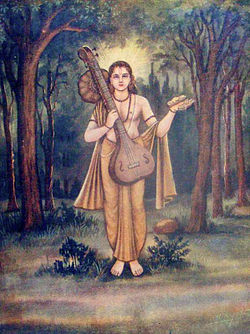
Narada (Sanskrit: नारद, Nārada, possibly derived from "năra", meaning man) [1] is a Vedic sage who plays a prominent role in a number of Hindu texts, notably the Ramayana and the Bhagavata Purana. Narada is arguably ancient India's most travelled sage with the ability to visit distant worlds and realms (Sanskrit lokas). He is depicted carrying a Veena, with the name Mahathi and is generally regarded as one of the great masters of the ancient musical instrument. This instrument is known by the name "mahathi"[2][3] which he uses to accompany his singing of hymns, prayers and mantras as an act of devotion to Lord Vishnu. Narada is described as both wise and mischievous, creating some of Vedic literature's more humorous tales. Vaishnav enthusiasts depict him as a pure, elevated soul who glorifies Vishnu through his devotional songs, singing the names Hari and Narayana, and therein demonstrating bhakti yoga. The Narada Bhakti Sutra is attributed to him.
Narada is also said to have orated the maxims of the Nāradasmṛti (100 BC – 400 CE), which has been called the "juridical text par excellence" and represents the only Dharmaśāstra text which deals solely with juridical matters and ignoring those of righteous conduct and penance.[4]
Tamil cultural proponents insist that sage Narada was invoked by legendary Carnatic musician, Thyagaraja, to produce his various compositions.
Enlightenment
The Bhagavata Purana describes the story of Narada's spiritual enlightenment: He was the primary source of information among Gods, and is believed to be the first journalist on Earth. He claimed to have 60 wives. In his previous birth Narada was a Gandharva (angelic being) who had been cursed to be born on an earthly planet as a sudra for singing glories to the demigods instead of the Supreme Lord.[5] He was born as the son of a maid-servant of some particularly saintly priests (Brahmins). The priests, being pleased with both his and his mother's service, blessed him by allowing him to eat some of their food (prasad), previously offered to their lord, Vishnu.
Gradually Narada received further blessings from these sages and heard them discussing many spiritual topics. After his mother died, he decided to roam the forest in search of enlightenment in understanding the 'Supreme Absolute Truth'.
Reaching a tranquil forest location, after quenching his thirst from a nearby stream, he sat under a tree in meditation (yoga), concentrating on the paramatma form of Vishnu within his heart as he had been taught by the priests he had served. After some time Narada experienced a vision wherein Narayan (Vishnu) appeared before him, smiling, and spoke "that despite having the blessing of seeing him at that very moment, Narada would not be able to see his (Vishnu's) divine form again until he died". Narayan further explained that the reason he had been given a chance to see his form was because his beauty and love would be a source of inspiration and would fuel his dormant desire to be with the lord again. After instructing Narada in this manner, Vishnu then disappeared from his sight. The boy awoke from his meditation both thrilled and disappointed.
For the rest of his life Narada focused on his devotion, meditation upon and worship to Vishnu. After his death Vishnu then blessed him with the spiritual form of "Narada" as he eventually became known. In many Hindu scriptures Narada is considered a saktyavesa-avatara or partial-manifestation (avatar) of God, empowered to perform miraculous tasks on Vishnu's behalf.
Temple
Narada Temple is dedicated to the Divine Sage Narada. These temples are located in Chigateri, which is 50 km away from Davanagere, Karnataka, India and the temple is famous in neighbouring districts of Davanagere, and in Korva which is 29 km north-east of Raichur in Karnataka, India. Korva is a beautiful island surrounded by the Krishna River. Korva is looked upon as a holy place and is popularly known as Naradagadde - one of the most scenic islands on the Krishna River. Due to its exquisite location the temple is not only visited by devotees but also by tourists.
See also
- Narad Bhakti Sutra
- Bhagavata Purana
- Four Kumaras
- Nāradasmṛti
- Vishnu
Footnotes
- ↑ http://spokensanskrit.de/index.php?script=HK&beginning=0+&tinput=+nara&trans=Translate&direction=AU
- ↑ Guy, Randor (31 July 2010). "Bhaktha Naradar 1942". The Hindu. http://www.hindu.com/mp/2010/07/31/stories/2010073151750700.htm. Retrieved 9 October 2011.
- ↑ Bhag-P 1.5.1 Narada is addressed as 'Vina-panih', meaning "one who carries a vina in his hand"
- ↑ Lariviere 1989: ix
- ↑ Srimad Bhagavatam 7.15.72
References
- Translation by Richard W. Lariviere (1989). The Nāradasmr̥ti. University of Philadelphia.
External links
- Complete Narada-Bhakti-Sutradead links on site
- Narada's Instructions on Srimad-Bhagavatam for Vyasadeva
- Translation from Sanskrit of Narada Bhakti Sutras at www.urday.com/narad.htm
- References to Narada in Gaudiya Vaishnava texts
- Ruesi Narot - Narada in Buddhist Thailand
| ||||||||||||||
| |||||||||||||||||||||||||||||||
Template:Caitanya sampradaya
| This Creative Commons Licensed page uses content from Wikipedia (view authors). The text of Wikipedia is available under the license Attribution-Share Alike 3.0 Unported (ToU). |

